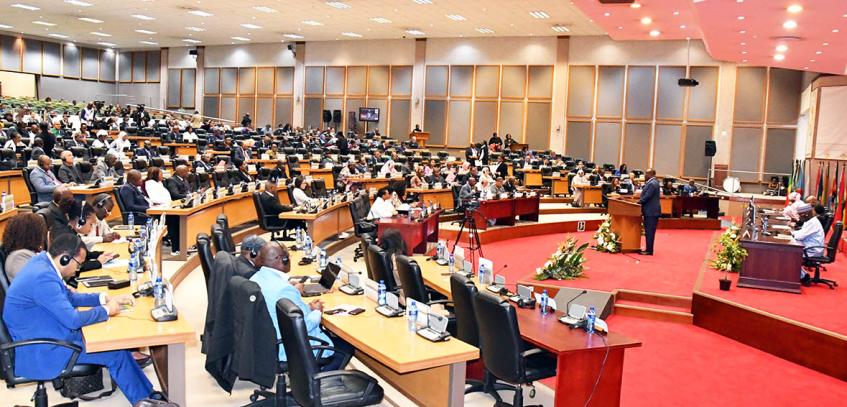Amid a spirit of unity and urgency, African leaders gathered at the Pan-African Parliament in Midrand, South Africa, sharing powerful solidarity messages that underscored Africa’s collective determination to advance justice, deepen democracy, and accelerate development across the continent.
This year’s Fifth Ordinary Session of the Sixth Pan-African Parliament aligns with the African Union’s 2025 theme, “Justice for Africans and People of African Descent through Reparations.” The theme is not merely symbolic; it represents a call to action for Africa to reclaim its narrative, pursue reparatory justice as a right, and dismantle structural inequalities that have long undermined the continent’s development and self-determination.
H.E. Hilarion Etong, President of the Parliamentary Assembly of the Francophonie (APF), hailed the Pan-African Parliament as “a symbol of peace, vision, and the legacy of Nelson Mandela”.
He reaffirmed APF’s commitment to: Promoting the French language, rule of law, and human rights; Supporting education systems and French-language education; Encouraging sustainable development and cultural cooperation and Collaborating with the Parliament on advancing governance and development.
Acknowledging challenges like poverty, social disparities, and climate change, Hon. Etong remained optimistic, stating: “Africa has a committed youth and dedicated parliamentarians committed to serving its future despite our linguistic diversity.”
Rt. Hon. Hamma Salama, Speaker of the Saharawi National Council, expressed appreciation for the Pan-African Parliament’s unrelenting defence of AU founding ideals and devotion to African rights and interests.
Amid “growing unilateralism and devaluation of multilateralism” he underscored the continued promotion of “democratic institutions, good governance, transparency, and the rule of law” as key priorities for the Parliament.
“This theme challenges all Africans, both at home and in the diaspora, to reclaim justice, dignity, and historic redress,” stated Hon. Sylvia Lucas, Vice President of the SADC Parliamentary Forum (SADC PF), delivering her solidarity message.
Commending the Pan-African Parliament, Hon. Lucas, highlighted the Parliament’s commitment to “people-centred justice, inclusive development, gender and youth rights, climate justice, accountability, and regional unity.”
She recalled the call for African parliaments to embrace digital transformation and artificial intelligence to enhance legislative responsiveness.
Hon. Lucas outlined areas for deeper collaboration with the Parliament, calling for joint action on climate change, ending child marriage through legislative reform, and advancing African Continental Free Trade Area (AfCFTA) implementation and cross-border trade oversight. Reporting progress on transforming SADC PF into a fully-fledged Regional Parliament, she noted:
“Thirteen out of the fifteen member states signed the agreement, and we are expecting the last two to sign in the near future.”
However, she cautioned about dwindling donor support, framing it as a democratic concern threatening programme sustainability. She urged exploration of new models of resource mobilisation, joint toolkits, and co-developed missions to support member states, calling for aligned parliamentary oversight that “moves justice and reparations from slogan to action”.
Delivering Ghana’s solidarity message, Hon. Bernard Ahiafor, on behalf of Speaker Hon. Alban Bagbin, emphasised: “Reparatory justice is justice, not charity, and is required for moral balance and sustainable development.”
Hon. Ahiafor recalled Africa’s leadership on reparations, from the Durban Declaration (2001) to the Accra Declaration (2022), affirming: “Africa will not let history’s wounds go unhealed. Reparatory justice must address both historical causes and ongoing injustices, such as our underrepresentation in international financial instruments.”
He called on the international community to share responsibility, urging that this Parliament session “mark a watershed and make reparatory justice a reality and not an aspiration only”.
H.E. Nardos Bekele-Thomas, CEO of AUDA-NEPAD, described the Pan-African Parliament as “the voice of the African people when Africa needed change” connecting the session to the outcomes of the Malabo Summit.
She emphasised: “Africa must move from words to assertive, concerted action to the challenges that now confront the world, including debt distress, constrained financing, and geopolitical uncertainty.”
Calling for Africa to become “an active participant in influencing the global agenda, not a passive recipient of aid” she underscored the need for unity, domestic resource mobilisation, and self-reliance.
She highlighted AUDA-NEPAD’s role in closing the $3.3 trillion financing gap for Agenda 2063 and coordinating a $500 billion pipeline of bankable projects.
H.E. Bekele-Thomas urged the Parliament “to be champions of Agenda 2063 domestication, improve parliamentary accountability, facilitate public participation, drive mobilisation of resources, and foster inter-parliamentary collaboration.”
Ambassador Marie Antoinette Rose Quatre, CEO of the African Peer Review Mechanism (APRM), extended solidarity, stating: “The APRM is in solidarity with Parliament as the voice and custodian of Africa’s democratic values, unity, and aspirations.”
Warning that “youth unemployment is a matter of life and death” she announced the 2027 Africa Governance Report on “Youth in Governance: From Promise to Prosperity” and called on Parliament’s support.
On financial sovereignty, she urged Parliament to campaign for the African Credit Rating Agency to strengthen Africa’s resource mobilisation and growth.
She announced the signing of a strategic MoU between APRM and Parliament during the session as part of advancing governance and peace under Agenda 2063.
“Vision with action can change the world. Let us consolidate democratic governance and create an Africa where leadership is accountable, resources are managed equitably, rights are secured, and prosperity is shared.”
-Ends-








